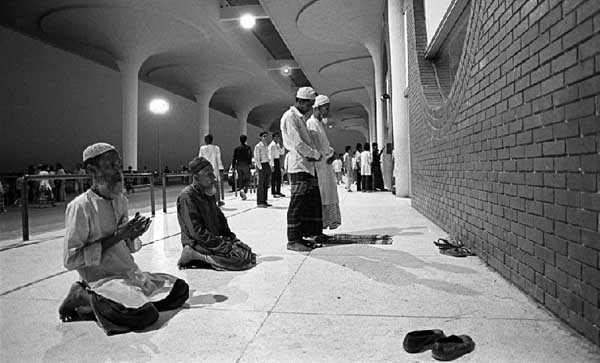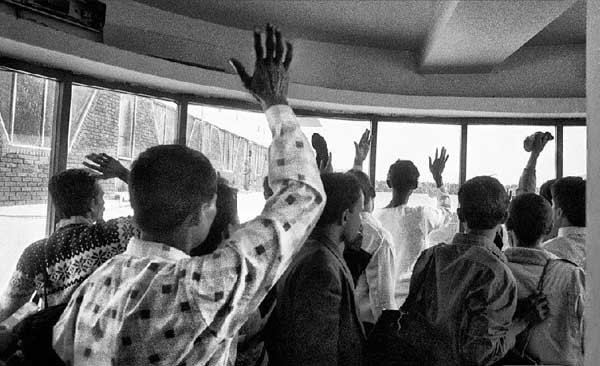By Gabriel Elizondo in Americas
Aljazeera
Wed, 2012-01-11 03:55.
In the northwest Brazilian Amazon town of Brasileia, population 20,238, there are almost 1,200 Haitians.
They often mill around during the day, clustered in groups in the shade trying to keep cool from the steamy heat, waiting for weeks for their work documents to be processed so they can get a job in another part of Brazil.
But on Tuesday it was the two other guys sitting alone who caught my attention. They could have been Bolivian perhaps, or even Brazilian. But I knew they weren?t.
?We are from Bangladesh,? AHM Sultan Ahmed, 36, tells me with a smile when I approach and ask to talk with them.
His friend, Abdul Awal, and my photojournalist, Maria Elena Romero, and I, all sit together on the grass and begin to chat.

They are from Dhaka, and arrived in Brasileia the night before. They slept on the ground in the main plaza, having nowhere else to go. For obvious reasons, they look tired, but still muster the energy to smile wide and often.
Why did you come to Brazil?
?I heard Brazil?s economy is growing, and that here is good for us and good jobs,? Ahmed says. ?Soon we can hopefully get our papers and find a job. I am happy?
?I think there is a lot of work in South America now, and a lot of people from my country are wanting to come here now,? he continues.
Neither has been to Brazil before, nor speak a word of Portuguese.
Ahmed tells me he is a trained painter and once worked in Greece. Awal, who worked in Malaysia, is an electrician.
Both men say they need work to support their families back home. Ahmed left behind a wife and seven-year-old daughter; Awal a wife and one daughter and two sons.
Long, Dangerous Journey
I just had to ask: So how do two men from Bangladesh get to one of the most remote corners of the Amazon in Brazil?
First, they tell me, they paid about $9,000 to a broker to arrange the journey. The trickster also promised easy and high-paying jobs in Ecuador.
So Ahmed and Awal paid up and flew from Dhaka to Dubai (4 hours, 30 minutes).
?Why not just work in Dubai,? I ask.
?Not much work, Brazil is better I think,? Ahmed says.

In the UAE, they boarded a flight that brought them non-stop from Dubai to Sao Paulo. It?s about a 15-hour flight.
Because they didn?t have a visa for Brazil, when they landed in Sao Paulo they could not leave the airport, and had to transfer to another flight to Santiago, Chile (3 hours, 15 minutes).
After a long layover in Santiago, another flight to Quito, Ecuador, (5 hours) where they stayed a few days.
?No work for us in Ecuador,? Ahmed says.
So they sharpened their focus on Brazil, a country recently named the world?s sixth largest economy by a consulting firm.
But because they didn?t know the logistics how to get to Brazil without a visa, they were forced to pay $5,400 to another “middle man” who basically said: ‘It’s complicated, but don’t worry, I’ll arrange it all.’
Border crossing
Soon they found themselves on a public bus for a 26 hours journey from Quito to Lima, Peru. From there they transferred to another bus, and another 12-hour journey over mountain passes to Inapari, Peru, a dusty border town with Brazil.
Still with no visa for Brazil, and in a far away land and culture they didn?t know, another local shady character demanded $600, they say, to secretly drive them to the Bolivian side of the border and then guide them the few kilometres through the jungle into Brazil.
But the two men only had $300 in cash left. So the man asked for Ahmed?s cellphone to cover the rest. Having no other choice, he handed it over.
Yesterday, 21 days after leaving Dhaka, the two men straggled into Brasileia.
Ahmed had $20 in cash, and a few loose coins in Brazilian money. And no cellphone to call home.
They bought a snack and some water to celebrate their arrival.
?We have $10 now,? he said.
They delivered their passports to the local federal police offices for processing for a work permit.
But the two men had better get used to Brasileia.
The wait time is averaging four weeks.
Cultural Shock
As I am sitting on the grass talking to my two new friends from Bangladesh, a good-natured, middle-aged Brazilian man comes by and asks us where we were from. ?They are from Bangladesh,? I say.
Probably not knowing where to take the conversation from there, he resorts to a well-tested, male fall-back: ?You have beautiful girls over there?? he says, laughing.
When that doesn’t solicit much of a response from Ahmed or Awal, the Brazilian concedes: ?Bangladesh is the capital of India, right??
Mr. Ahmed smiles gently.???India, Pakistan, Bangladesh …,? trying to help the man place it on his mental map of the world.
?Nossa senhora,? the Brazilian says, before taking off to continue his jog.
It is a quick and dirty geography and cultural lesson between two unlikely people in the most improbable place imaginable.
But this isn’t the first time.
When I was in the neighbouring town of Epitaciolandia in May, working on stories about Haitians coming to Brazil, I also met a group of four men from Bangladesh who migrated to Brazil looking for work.
New trend
It appears to be a new and growing trend of east to west, south to south migration. At least from Bangladesh to Brazil.
?When you get your work papers, where will you go?? I ask Ahmed.
?Maybe Sao Paulo, but I would like Brasilia,? he says.
While the Haitian migrants in Brasileia have each other to support, Ahmed and Awal do not. They are on their own, in a very different universe now.
I ask Ahmed if he misses his family.
He looks down towards the grass, and then back up again to my eyes, and says: ?Sure, of course, I must go back at some time.?
His eyes are red, but I am not sure if it is because he is about to cry, or just from 21 days of travel around the world.
I decided not to push the issue.
?Good luck, my friends,? I say, as we all exchange handshakes. ?Hope to see you tomorrow. And welcome to Brazil.?
?Oh, thank you, thank you, thank you so much? they reply back, smiling.
Undocumented migrants from Bangladesh in a far corner of the Brazilian Amazon looking for work to support families on the other side of Earth.
Yes, the world is changing. Fast. Stay safe, gentlemen. Good luck. And may you both achieve your Brazilian dream.
Photo story on Bangladeshi migrant workers





Leave a Reply
You must be logged in to post a comment.